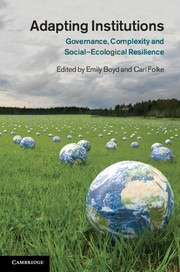Book contents
- Frontmatter
- Contents
- Illustrations
- Contributors
- Foreword
- Acknowledgements
- Acronyms and abbreviations
- 1 Adapting institutions, adaptive governance and complexity: an introduction
- Part I Adapting local institutions, networks, leadership and learning
- Part II Adapting and governing public institutions for uncertainty and complexity
- Part III Adapting multi-level institutions to environmental crisis
- 9 Double complexity: information technology and reconfigurations in adaptive governance
- 10 Adaptive governance and natural hazards: the 2004 Indian Ocean tsunami and the governance of coastal ecosystems in Sri Lanka
- 11 Adapting to global climate change: evaluating resilience in two networked public institutions
- 12 Conclusions: adapting institutions and resilience
- Index
- References
9 - Double complexity: information technology and reconfigurations in adaptive governance
from Part III - Adapting multi-level institutions to environmental crisis
Published online by Cambridge University Press: 05 November 2011
- Frontmatter
- Contents
- Illustrations
- Contributors
- Foreword
- Acknowledgements
- Acronyms and abbreviations
- 1 Adapting institutions, adaptive governance and complexity: an introduction
- Part I Adapting local institutions, networks, leadership and learning
- Part II Adapting and governing public institutions for uncertainty and complexity
- Part III Adapting multi-level institutions to environmental crisis
- 9 Double complexity: information technology and reconfigurations in adaptive governance
- 10 Adaptive governance and natural hazards: the 2004 Indian Ocean tsunami and the governance of coastal ecosystems in Sri Lanka
- 11 Adapting to global climate change: evaluating resilience in two networked public institutions
- 12 Conclusions: adapting institutions and resilience
- Index
- References
Summary
Introduction
The sustainability science community has for decades focused on the governance challenges associated with incremental environmental stresses, such as climate change, biodiversity loss, deforestation and environmental pollution. That is likely to change, due to the increased acknowledgement of the possibilities of rapid, interacting and cascading environmental change. The possible implications of abrupt climate change, the notion of interacting multiple social–ecological crisis at the global scale (Walker et al. 2009), suggestions of interacting ‘thresholds’ or ‘tipping points’ at the planetary scale (Lenton et al. 2008, Rockström et al. 2009), as well as the surprising nature of rapid multi-level change in social–ecological systems (Gunderson and Holling 2002, Steffen et al. 2004), all bring to light the need to understand the governance challenges of rapid non-linear change.
This also raises the issue of societies’ ability to steer complex adaptive and global social–ecological systems, with institutions, organisations and collaboration patterns that by themselves are highly complex, and face one of the most rapid information technological changes in human history (Castells 2009). Bluntly put: can state and non-state actors really govern complex social–ecological systems, with complex governance systems, in times of rapid unexpected change? This dual challenge is what I denote ‘double complexity’.
- Type
- Chapter
- Information
- Adapting InstitutionsGovernance, Complexity and Social-Ecological Resilience, pp. 193 - 215Publisher: Cambridge University PressPrint publication year: 2011
References
- 2
- Cited by



